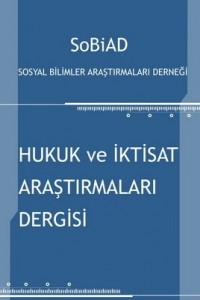Öz
Bu çalışmada bireysel olarak mutluluğa etki eden faktörlerin akademisyenler özelinde araştırılması amaçlanmaktadır. Bu kapsamda bir anket formu oluşturularak TÜİK istatistiki coğrafi bölge birimleri sınıflandırması kapsamında Karadeniz Bölgesini ifade eden TR8 ve TR9 bölgelerindeki devlet üniversitelerinde görev yapan akademisyenlere uygulanmıştır. Bu şekilde elde edilen veriler Bağımsız İki Örnek T-Testi ve ANOVA analizi gibi çeşitli istatistiki yöntemlerle analiz edilerek bulgular ortaya koyulmuştur. Çalışmanın sonucunda akademisyenlerin genel olarak yaşamlarından memnun oldukları ve mutluluk düzeylerinin yüksek olduğu ortaya koyulmuştur. Bununla birlikte akademisyenlerin genel yaşam anlamında en önemli mutluluk unsurlarının aile ve sağlık, mesleki anlamda en önemli mutluluk unsurlarının yayın yapmak ve mezun edilen öğrencilerin mesleki başarısı olduğu ifade edilmiştir. Ayrıca akademisyenlerin mutluluk düzeylerinin ise unvan, çalışma alanı ve medeni durum faktörlerine bağlı olarak farklılık gösterdiği ortaya koyulmuştur.
Anahtar Kelimeler
Kaynakça
- Altunöz, Utku & Altunöz, Hasip, Davranışsal Ekonomi (Nörofinans). Ankara: Seçkin Yayıncılık, 2016.
- Aziz, Rashid, Mustaffa, Sharif, Samah, Narina A. & Yusof, Rosman.” Personality and happiness among academicians in Malaysia”, Procedia - Social and Behavioral Sciences, 116, 2014, 4209 – 4212.
- Babula, Elzbieta & Mrzyglod, Urszula. “Economic Determinants of Happiness Among European Nations”, İnternational Journal of Academic Research, 5(3), 2013, 519-524.
- Blenchflower, David G. & Oswald, Andrew J. “Well-Being Over Time in Britain and The USA”, Journal of Public Economies, 88, 2004, 1359-1386.
- Caz, Çağdaş & Tanyeri, Levent.“The Relationship between Life Satisfaction and Academic Performance: An Example of Sports Science”, World Journal of Education, 8(5), 2018, 192-197.
- Chow, Henry P.H. “Life Satisfaction Among University Students İn A Canadian Prairie City: A Multivariate Analysis”, Social Indicators Research, 70, 2005, 139-150. Diener, Ed & Seligman, Martin E. P. “Beyond Money: Toward an Economy of Well-Being”, Psychological Science in the Public Interest, 5(1), 2004, 1-31.
- Dockery, Alfred Michael. Happiness, Life Satisfaction and The Role of Work: Evidence From Two Australian Surveys, Paper Presented at 10th National Conference on Unemployment, Newcastle, 2003.
- Gökdemir Dumludağ, Özge. Mutluluk ve İktisadi Parametreler Üzerine Bir İnceleme, Yayımlanmamış Doktora Tezi, İstanbul Üniversitesi, Sosyal Bilimler Enstitüsü, İstanbul, 2011.
- Duncan, Roderick, Tilbrook, Kerry & Krivokapic-Skoko, Branka. “Does academic work make Australian academics happy?”, Australian Universities’ Review, 57(1), 2015, 5-12.
- Easterlin, R. “Does Economic Growth Improve the Human Lot? Some Empirical Evidence”, in: David, Paul Allan ve Melvin Warren Reder (Ed.), Nations and Households in Economic Growth, New York: Academic Press, 1974, ss. 89-125. Easterlin, Richard. “Happiness, Growth, And Public Policy”, Economic Inquiry, 51(1), 2013, 1–15.
- Frey, Bruno S. & Stutzer, Alois. “Maximizing Happiness”, German Economic Review, 1(2), 2000, 145-167.
- Frey, Bruno S. & Stutzer, Alois. “What can Ecomomists Learn from Happiness Research?”, Journal of Economic Literature, 40(2), 2002, 402-435.
- Gerdtham, Ulf G. & Johannesson, Magnus. “The Relationship Between Happiness, Health and Socio-Economic Factors: Results Based on Swedish Microdata”, Journal of Socio-Economics, 30, 2001, 553-557.
- Gerlach, Knut & Stephan, Gesine. “A paper on Unhappiness and Unemployment in Germany”, Economics Letters, 52, 1996, 325-330.
- Guazelli, Gustavo Piva & Zilli, Julcemar Bruno. “Economics of Happiness: A Study on Happiness Indicators in University Professors”, Ecoforum, 5(1), 2016, 171-181.
- Layard, Richard. “Happiness and Public Policy”, LSE Health and Social Care Discussion Paper, No. 14, 2005. Mookerjee, Rajen & Beron, Krista. “Gender, Religion and Happiness”, Journal of Socio-Economics, 34, 2005, 674-685.
- Piero, Amado. “Happiness, Satisfaction and Socio-economic Conditions: Some International Evidence”, The Journal of Economics, 35(2), 2006, 348-365.
- Perovic, Lena Malesevic & Golem, Silvia. “Investigating Macroeconomic Determinants of Happiness in Transition Countries How Important is Government Expenditure?”, Eastern European Economics, 48(4), 2010, 59-75.
- Servet, Olcay. “Mutluluğun Türkiye’deki Belirleyenlerinin Zaman İçinde Değişimi”, Akdeniz İ.İ.B.F. Dergisi (35), 2017, 16-42.
- Şeker, Murat, Mutluluk Ekonomisi-Kamu Ekonomisi Açısından Bir Analiz-. İstanbul: Türkmen Kitabevi, 2016.
- Tian, Guoqiang & Yang, Liyan (2008). A Formal Economic Theory for Happiness Studies: A Solution to the Happiness-Income Puzzle, http://people.tamu.edu/~gtian/happy2.pdf, [İndirme Tarihi: 18.12.2020]
- Toker, Boran. “Life satisfaction among academicians: an empirical study on the universities of Turkey”, Procedia - Social and Behavioral Sciences, 47, 2012, 190-195.
- TÜİK, Yaşam Memnuniyeti Araştırması, Ankara, 2020.
- Veenhoven, Ruut. “Happiness: Also known as ‘life-satisfaction’ and ‘subjective well-being, Handbook of Social Indicators and Quality of Life Research”, Kenneth C. Land, Alex C. Michalos, and M. Joseph Sirgy (Ed.), Dordrecht, Netherlands, 2012.
- Zhang, Shishu & Ou, Shuenn-Hae. “The Impact of Inflation on Expenditures and Happiness in China”, Journal of Chinese Economics, 1(1), 2013, 55-76.
Ayrıntılar
| Birincil Dil | Türkçe |
|---|---|
| Konular | Ekonomi |
| Bölüm | Araştırma Makalesi |
| Yazarlar | |
| Yayımlanma Tarihi | 31 Temmuz 2021 |
| Yayımlandığı Sayı | Yıl 2021 Cilt: 13 Sayı: 1 |


